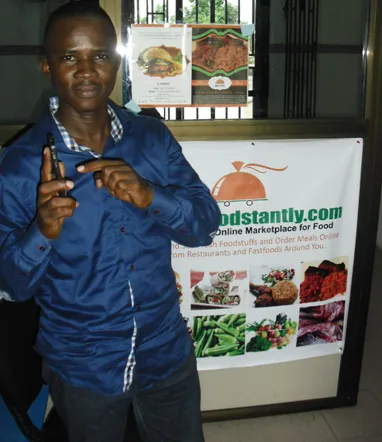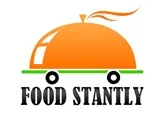The story of Foodstantly, an African food marketplace in the making
"The food space is very interesting because it has one of the largest share of wallets in the world in terms of how much people spend on food, and yet food has one of the lowest incidences of e-commerce penetration in the world," Chris Muscarella
It is a brutal space to be in though. Not many come out alive, only a few startups make money doing it.
Africa’s largest economy with 170 million population Nigeria‘s retail food sector consists of supermarkets (1.0 %), small groceries (34%), and traditional, open-air markets share (65 %) of total retail food sales. This is the space that the new generation food-marketplace-startups salivate over.
The founder
While he was in university, Uche Ariolu had set up a Roasted Food outlet which aimed to be a chain of barbecued food outlet across Nigeria. Back then he was very young and hyper ambitious. His venture didn’t grow more than one outlet and eventually failed due to inexperience and his commitment towards his studies. After law school, he dabbled in series of businesses. Finally, he set up TicketMyPal, which is an event discovery and online ticket sales platform.

Talking about his inspiration and aha moment, Uche Ariolu told YourStory, “The idea has been with me when I was working in a food and catering outfit just before university. I noticed the stress and hassles people experience when shopping for food, including foodstuffs and meals. I also noticed the hassles suppliers, farmers and traders experience in getting the food to the end user. And I felt there must be a better way to shop for food; there must be a better way for farmers, traders and other food suppliers to make food accessible to consumers. However, at that time internet was at its infancy, so the idea had to wait until we had a better internet penetration and adoption.”
What is Foodstantly?
Foodstantly is an online marketplace for food. Just like in a city you have open air markets and restaurant that people visit to shop for food, Foodstantly is its online version. It’s an online version of your open air market as well as your online version of all the restaurants and fast-food shops. It’s a one-stop shop for all your food needs.
Foodstantly uses technology to provide market access to farmers, food traders and restaurants.
Uche Ariolu says, “We do this by providing them with a mobile –web platform to set up shops, accepts payment, display good, promote goods and deliver direct to millions of consumers across the nation. The sellers are given an easy, simple to use interface to register, set up online shop and start selling through their mobile phones or internet enabled device.”
3 main product verticals
Ready to cook: This is for buying and selling of fresh food stuffs and farm produce. The supplier or sellers in this are the farmers, food traders, and frozen food dealers. This group sells directly through their shops on our platform to consumers. They are provided with the technology and business solutions. Any farmers or trader can sell through their mobile phones it’s as easy as that.
Ready to eat: Is for restaurant discovery and online food ordering. Consumers can discover variety of meals and places to eat, can order food from fast foods and restaurants and take delivery at home or office. The restaurants and fast-food are given the technology and business solutions to sell online at no set up cost.
Farm Produce Aggregation: This involves entering into partnership with farmers; sign them up in a contract with them. They take delivery from the farm gate of all their harvest, sort it in sorting centers and sell it direct to consumers on the platform.

At Foodstantly, they have a very simple product development philosophy to solve all the technology and access to market challenges faced by sellers so they can focus on producing food for customers. “We want a product that will be easy to use with little or no learning. We want a product that anybody notwithstanding their level of IT savvy can use. That will replicate or clone the offline market experience for food stuff sellers/ farmers and restaurant. We want a product that will make it very easy for sellers to sell with our without a computer or internet connection. We want users to be able to buy food conveniently, stress free and without wasting time,” says Uche, adding, “While doing this we want to be very scalable and take this to the rest of Africa.”At present, the six-member team of Foodstantly is based in Port Harcourt Nigeria making their platform available nationwide with large number of registered users in Lagos. The team comprises capable individuals with each providing their skill set in areas such as business development, marketing and product development.
How does Foodstantly fend off the competition, the likes of Rocket Internet in the space they are in?
“Competition,” says Uche Ariolu, “is good for our ecosystem. It makes you want to improve, thereby benefiting the customers. Competition creates a better product. Rocket Internet backed Hello Food is doing well and I have respect for them but we know the market is huge and still untapped. Besides, Hello Food only competes in the ready-to-eat product line which is the restaurant discovery and meal ordering segment. Our other two product lines are not in competition with them.
“We have strategies to grow our business and if the business grows bigger than theirs and takes dominant market share, then we don’t have to fend them off, that will be their responsibility.”
He further adds, “There are strategies we have that we know can keep us ahead. Besides don’t forget we are a marketplace for food, the only marketplace for food in Nigeria at the moment, so we have some differentiators that set us apart and give us some advantage. We are a small team so we are very nimble, flexible and able to take quick decisions and we are hands on and understand the pains of the sellers and buyers.”
He says for the ready-to-cook market their major competitors are the open air market and they want to disrupt that business, as it is untidy, cumbersome, disorganized and very inconvenient to shop for food in the open air market. “Our use of technology, promise of convenience and other value propositions gives us an advantage over the open air market.”
What is Foodstantly’s revenue model?
“We collect commission for each item sold on the platform. We also make revenue from delivery fee for sellers who use our delivery support system and we have premium packages which gives us additional revenue stream. Commission is paid by the sellers only when sales are made through the platform,” remarks Uchi.
Challenges faced by Foodstantly
Foodstantly’s challenges are many. The main ones are: trust for online payment, hiring quality talent, creating awareness for the product, delivery issues and funding. Uchi says, “We are still overcoming each of this and getting better by the day. We adapt and try to build the challenges and feedbacks we get into solutions that will benefits our customers.”
Uchi has a few words for the ecosystem partners. “For delivery partners we expect rapid response and efficient delivery. We want to have the fastest delivery possible so we expect our delivery partners to be able to take up that challenge. We expect some payment providers to educate the populace on the security measures available and get them to trust online payment. And the charges should be reduced for online merchants. They need to make customized products that are tailored for an industry, not the one-size-fits-all that is currently in place. We have lots of ideas for that maybe at some point in the future we can build a business on that if none of the payment providers meet these challenges.”
Foodstantly pitching at Demo Africa 2014
Demo Africa 2014 is a pan African tech event where YourStory is a media partner. So we asked the Founder of Foodstantly, what it meant to be a part of Demo Africa 2014 pitch? Uchi replies, “It feels good and gives us lots of attention which can be leveraged to grow the business and make people aware of the business. Plus it gives us opportunity to meet investors and partners and mentors, which is a good validation for us. But we know that is the beginning of more hard work, we don’t celebrate we just work harder and smarter.”
Closing thoughts
Though the startup didn’t share the exact numbers; they claim they are seeing sales increase on a month to month basis. Foodstantly does market offline through their marketing force by meeting end users and sellers making them realize the importance of taking their business online and how the platform can help them make more sales. Uchi points out, “We also do digital marketing basically via social media and we have some content marketing strategy. We are also working on some partnerships that will boost our marketing as well as other marketing strategies that we are unveiling gradually.”
Obviously busy people want to save an hour or two from going grocery shopping by outsourcing the chore to an app. Even the elderly and the disabled find such services God sent. The space is getting attention of the world over, and investors are also biting the space with series of investment injection in Delivery Hero, Munchery, JustEat, Instacart, Blue Apron & Plated. It can be attributed to GrubHub’s wildly successful IPO; CB Insight says, “Over the last four quarters, companies operating in the food & grocery e-commerce and delivery industry have raised nearly $486M across 109 deals globally.”
Among other slew of food startups, AmazonFresh and Google Shopping Express are also busy honing their respective delivery services and signing up retailers to rapidly meet customer demands.
Because food is something that people need multiple times a day, some investors even went on as far as predicting the next Uber-like success would emerge from the food market.
When Africa is poise to be the food basket to the world, what role will the Continent’s food startups play?







